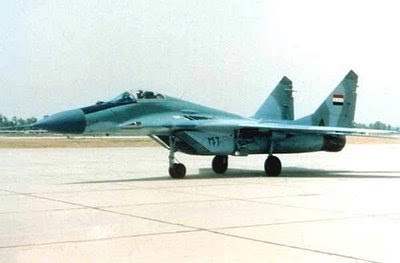During the recent visit to Moscow by the Lebanese Minister of Defense, his Russian counterpart offered to provide 10 MiG-29 (FULCRUM) fighters to the Lebanese Air Force. This came as a surprise to the Lebanese (as well as the Israelis and Americans). Of course, an offer is not delivery - I will be astonished if we see MiG-29 fighters over Lebanon wearing the roundel of the Lebanese Air Force anytime soon.
The MiG-29 entered service in the early 1980's to counter American-built F-15 and F-16 fighters. In the only combat match ups between the MiG-29 and the American-built fighters - in Iraq and the Balkans - no American-built fighters have been lost, while as many as 20 MiG-29's have been downed. A contributing factor in this disparity of performance between the MiG and F-15 and F-16 is of course the skill of the pilots.
Let's look at what might be behind this surprising announcement. Delivering advanced fighter aircraft does not happen overnight, nor does it happen in a vacuum - a lot of things are required to make such an effort possible. As they say, the devil is in the details.
First, Lebanon has traditionally purchased its weapons from the West, mostly from the United States. Its current Air Force inventory consists of four antiquated British-made Hawker Hunters, a few dozen American-made UH-1H Huey helicopters and a handful of French-made Aerospatiale SA-342 Gazelle attack helicopters. The Air Force is not capable of defending Lebanese airspace - Israeli fighter and reconnaissance aircraft overfly the country often and at will.
Since the end of the Hizballah-Israel conflict in 2006, the United States has pledged to upgrade the capabilities of the Lebanese armed forces, but to date not much more than training has materialized. There is a reluctance in Washington (not to mention Tel Aviv) to provide weapons to the Lebanese that might end up on the hands of Hizballah. Since 2006, Hizballah has emerged as one of the major power brokers in the country.
Should this be a serious offer by the Russians, there are other considerations as well. The Lebanese will need qualified pilots to fly the fighter jets. While we might not consider the MiG-29 a state of the art military aircraft, it is more advanced by several orders of magnitude than the Hawker Hunter. Will the Lebanese pilots train in Russia, or will we see a Russian military training mission in Lebanon? Neither is something the United States or Israel would welcome.
A squadron of advanced jet fighter aircraft will require a much more robust maintenance capability than that currently in the Lebanese Air Force. There will need to be fairly high-tech test equipment, spare parts, avionics maintenance, and support for whatever weapons package accompanies the aircraft. Again, will we see the establishment of a Russian military advisor presence in Lebanon similar to what we see in Syria?
What do the Russians hope to accomplish with this offer to the Lebanese? They may be trying to make inroads to what has traditionally been a Western-allied military. Lebanese officers are trained at facilities in the United States and Europe. This may be more of Russia reasserting its military capabilities around the world - much of it fueled by higher oil prices earlier in the year. There have been increased Russian strategic aviation flights near Alaska, recent ship visits to Venezuela and Cuba, as well as increased Russian naval activity in the Mediterranean, including port visits to Syria and Libya. There have been rumors of a permanent Russian naval presence at the Syrian port of Tartus.
My analysis
I doubt the Russians would have made such an offer to the Lebanese without Syrian acquiescence. Syria believes Lebanon to be in its sphere of influence. I am of the opinion that the Syrians will eventually engineer a crisis in Lebanon that will cause the Lebanese government - with the urging of Syrian-Iranian proxy Hizballah - to request the reintroduction of Syrian troops. Syrian troops provided the pax syriana in Lebanon from 1976 to 2005.
Provision of the Russian MiG-29's to Lebanon is a great ploy for the Syrians. Rather than the Russians establishing a large (and expensive) maintenance and training facility in Lebanon for only 10 aircraft, Syria can provide all the things required, easier and cheaper.
Syria operates three squadrons of MiG-29's from its air base at Sayqal (about 60 miles east northeast of Damascus). It has qualified pilots and an established maintenance base less than 15 minutes flying time from either of Lebanon's primary air bases. These bases - Riyaq in the Biqa' Valley or al-Qulayat near Tripoli, are both within six and five miles respectively of the Syrian border.
Syria will play a role in this delivery, if it in fact happens. I suspect that this whole episode was discussed between Damascus and Moscow before the Russian offer was made to the Lebanese.


.jpg)
